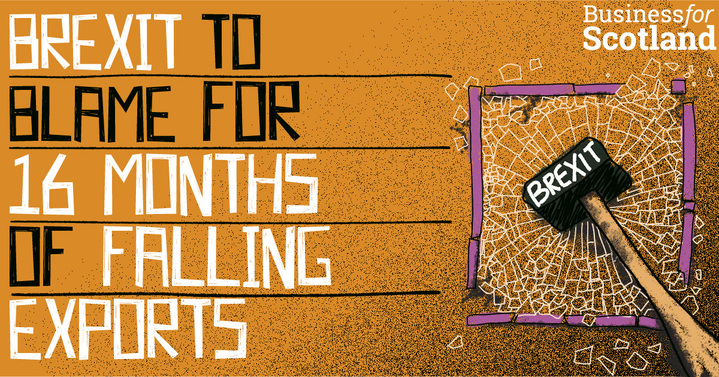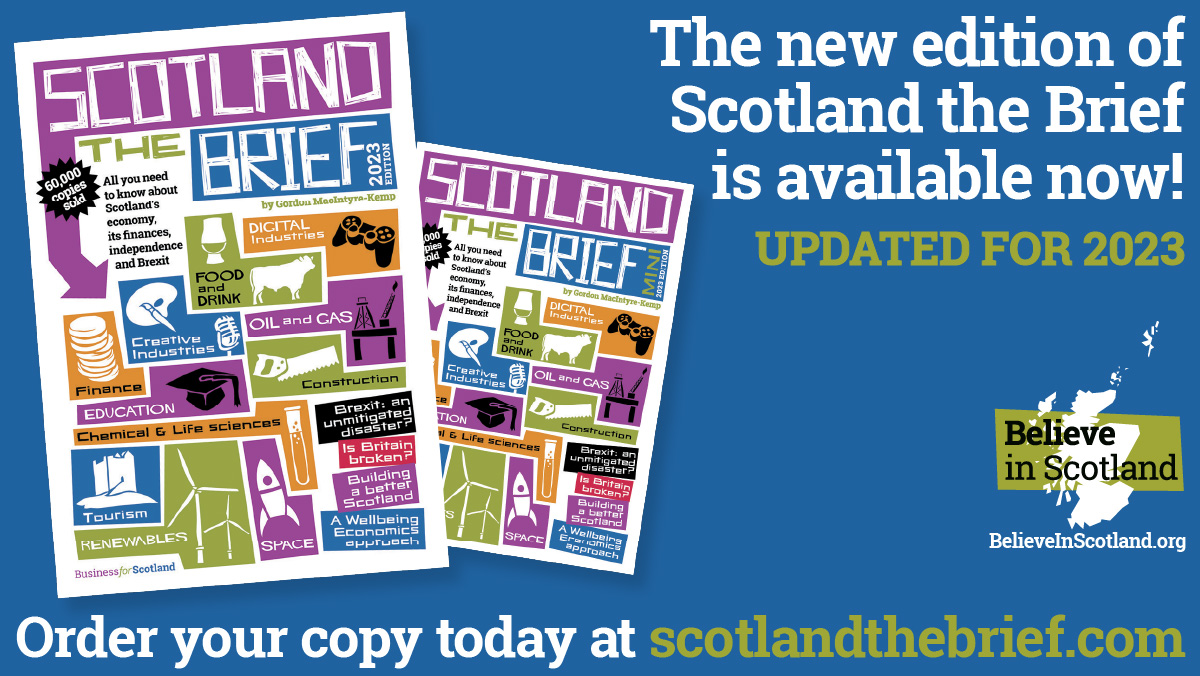For 16 months in a row, exports from the UK have fallen, due to Brexit. Businesses say they are losing their EU customers. They prefer to avoid the Brexit-related customs checks, delays and uncertainty that dealing with Scottish business now entails, by switching to suppliers in the single market.
The effects are uneven – oil and gas prices are high and they distort Scotland’s EU trade figures, making them look better than the UK. But if you drill down into the details, you can see that Brexit is gradually cutting off many of Scotland’s most successful sectors from the world’s largest trading market and that the real value of the trade, adjusted for inflation,is stagnant or falling compared to 2019.
Rural Affairs Secretary Mairi Gougeon said last month that there has been a 38% fall in Scotland’s fruit and vegetable exports, and a 7% fall in dairy exports between 2022 and 2019.
She told the Scottish Parliament: “Brexit has weakened our food and drink sector in so many ways. Many exports to the EU have fallen…products like seed, potatoes and chilled meats can no longer be exported to the EU at all – cutting off high-quality Scottish produce from this important market entirely.”
Sustainable shellfish like mussels can no longer be exported to the EU. The volume of salmon, which is overall the UK’s biggest food export, going to customers in the EU has also fallen compared with pre Brexit levels.
Fruit exports to the EU down by half
In the year to 31 March 2021, the UK sold about £250m worth of fruit to the EU. But sales for the year to March 2023 were down to £114m.
Chartered accountancy firm Hazlewoods, which analysed the figures, blamed factors including the risk of fruit rotting if delayed by customs or phytosanitary officials at EU ports. They found that retailers in continental Europe were put off by these risks and were now less likely to buy from the UK, choosing to import fruit from other countries within the bloc instead.
Lower production, also due to Brexit, is another contributing factor. Many Scottish soft fruit farmers, for example, are struggling because of the end of free movement which gave them a pool of skilled, seasonal workers from the EU. NFU Scotland’s Horticulture Chair Iain Brown, a soft fruit and vegetable grower from Fife, told the Herald recently: “We need migrants to get the food that is grown on our farms onto our plates, and not rotting in our fields. We need the government to move away from anti-migration politics and rhetoric to make good policy.”
Irish butter and cheese, not Scottish, lines European supermarket shelves
Like all foods of animal origin, Scottish dairy products now need a health certificate. That adds cost and it also puts buyers off because they fear there could be delays which will give them less time to sell the product before it goes off.
The Irish dairy sector has taken advantage of the opportunity – their exports to the EU are up 42% and the value topped £2 billion last year. 
So, instead of premium Scottish cheddar and butter in European supermarkets, shoppers see Irish alternatives. Irish butter firm Kerrygold’s global turnover grew by a quarter to nearly £3 billion last year.
Ireland’s fish processors are also benefiting from investment by the EU – receiving a boost of more than £20 million from the Brexit adjustment fund to upgrade facilities and build capacity in the sector.
The Irish economy will grow 4.9 per cent in 2023, according to the European Commission. In contrast, the OECD projected in March that the UK economy would shrink 0.2 per cent, the poorest performer in the G20 besides Russia (whose economy will shrink 2.5 per cent).
Scottish cheese goes to UK farm shops not EU delicatessens
For small, artisan producers across the UK that export cheese, Brexit caused havoc. Those who relied on the growing European appetite for British cheeses to boost their profits were hit hard, and some made the decision to pull out of the exporting market. The Centre for Business Prosperity at Aston University found that as many as 42% of the cheese varieties previously exported from the UK to the EU have disappeared since January 2021.
Cheesemaker Simon Spurrell explained in the Guardian recently:
“The disastrous turning point for meat and dairy producers came in October 2020, when Johnson used the whip and his majority to force an amendment to the agriculture bill…Until this point, there was an expectation that the UK would align its food standards with the EU and provide the UK’s producers with the smooth transition we were promised…Before the transition period ended, we knew that our wholesale shipments to the EU would need extra checks. We were aware of the requirement for a veterinary-checked Export Health Certificate (EHC) for every wholesale order, and the associated cost of £180 each time. But what we were not prepared for, or warned about, was the lack of exemption for consumer orders to this regulation, meaning even one single slice of cheese sent to an EU customer would also be liable to the charge.”
Those who survive have had to adapt. Highland Fine Cheeses is now exporting more cheese to the UK, through high end supermarkets Waitrose and Marks and Spencer. Owner Rory Stone said: “Brexit has, without a doubt, had a big effect. Imports are not flowing as freely as they once did. This means that supermarket buyers and major wholesalers are having to look closer to home to source products”
When import controls come in the situation will get even worse
The full weight of regulation is pressing down on exports. In contrast, import checks have been postponed again and again but are finally coming in this autumn. Full post-Brexit import controls will make food and drink coming in from Europe even more expensive, and it will be harder to find European cheese and other imports, experts warn. Brexit has already driven prices up – food inflation in the UK is higher than most of Europe, except for outliers like Hungary which has a falling currency.
Recently the LSE Centre for Economic Performance reported that:
“Between December 2019 and March 2023 food prices rose by almost 25%. This analysis suggests that in the absence of Brexit this figure would be 8 percentage points (30%) lower.”
Scotland would do better outside the stagnant, post-Brexit UK
Brexit is an unmitigated disaster for Scottish business. Their access to the biggest trading bloc in the world is slowly being cut off. Vibrant and dynamic businesses are being made uncompetitive against similar businesses within the EU, including in Ireland.
As trade reduces with the EU and increases within the UK, Unionists will seize on that to claim Scotland should not become independent.
But Ireland’s fast growing economy makes the opposite point – there is life outside the UK. Scotland has lots to do to catch up with Ireland and independence is a first step.








